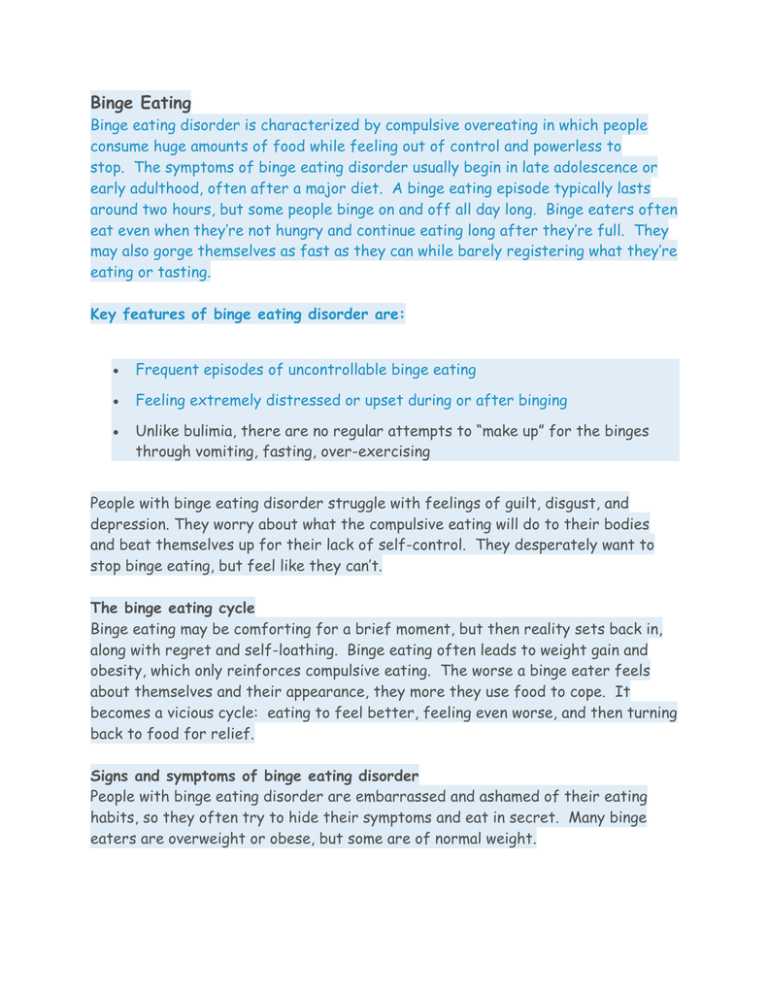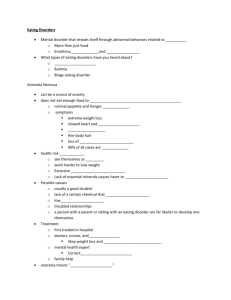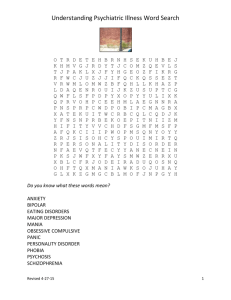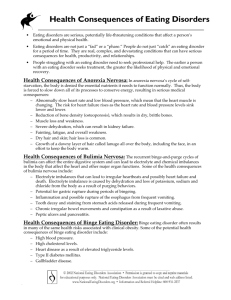File
advertisement

Binge Eating Binge eating disorder is characterized by compulsive overeating in which people consume huge amounts of food while feeling out of control and powerless to stop. The symptoms of binge eating disorder usually begin in late adolescence or early adulthood, often after a major diet. A binge eating episode typically lasts around two hours, but some people binge on and off all day long. Binge eaters often eat even when they’re not hungry and continue eating long after they’re full. They may also gorge themselves as fast as they can while barely registering what they’re eating or tasting. Key features of binge eating disorder are: Frequent episodes of uncontrollable binge eating Feeling extremely distressed or upset during or after binging Unlike bulimia, there are no regular attempts to “make up” for the binges through vomiting, fasting, over-exercising People with binge eating disorder struggle with feelings of guilt, disgust, and depression. They worry about what the compulsive eating will do to their bodies and beat themselves up for their lack of self-control. They desperately want to stop binge eating, but feel like they can’t. The binge eating cycle Binge eating may be comforting for a brief moment, but then reality sets back in, along with regret and self-loathing. Binge eating often leads to weight gain and obesity, which only reinforces compulsive eating. The worse a binge eater feels about themselves and their appearance, they more they use food to cope. It becomes a vicious cycle: eating to feel better, feeling even worse, and then turning back to food for relief. Signs and symptoms of binge eating disorder People with binge eating disorder are embarrassed and ashamed of their eating habits, so they often try to hide their symptoms and eat in secret. Many binge eaters are overweight or obese, but some are of normal weight. Behavioral symptoms of binge eating and compulsive overeating Inability to stop eating or control what you’re eating Rapidly eating large amounts of food Eating even when you’re full Hiding or stockpiling food to eat later in secret Eating normally around others, but gorging when you’re alone Eating continuously throughout the day, with no planned mealtimes Emotional symptoms of binge eating and compulsive overeating Feeling stress or tension that is only relieved by eating Embarrassment over how much you’re eating Feeling numb while binging—like you’re not really there or you’re on autopilot Never feeling satisfied, no matter how much you eat Feeling guilty, disgusted, or depressed after overeating Desperation to control weight and eating habits Signs of binge eating disorder Ask yourself the following questions. The more “yes” answers, the more likely it is that you have binge eating disorder. Do you feel out of control when you’re eating? Do you think about food all the time? Do you eat in secret? Do you eat until you feel sick? Do you eat to escape from worries, relieve stress, or to comfort yourself? Do you feel disgusted or ashamed after eating? Do you feel powerless to stop eating, even though you want to? Effects of binge eating disorder Binge eating leads to a wide variety of physical, emotional, and social problems. People with binge eating disorder report more health issues, stress, insomnia, and suicidal thoughts than people without an eating disorder. Depression, anxiety, and substance abuse are common side effects as well. But the most prominent effect of binge eating disorder is weight gain. Obesity and binge eating Over time, compulsive overeating usually lead to obesity. Obesity, in turn, causes numerous medical complications, including: Type 2 diabetes Gallbladder disease High cholesterol High blood pressure Heart disease Certain types of cancer Osteoarthritis Joint and muscle pain Gastrointestinal problems Sleep apnea Causes of binge eating and compulsive overeating Generally, it takes a combination of things to develop binge eating disorder— including a person’s genes, emotions, and experience. Biological causes of binge eating disorder Biological abnormalities can contribute to binge eating. For example, the hypothalamus (the part of the brain that controls appetite) may not be sending correct messages about hunger and fullness. Researchers have also found a genetic mutation that appears to cause food addiction. Finally, there is evidence that low levels of the brain chemical serotonin play a role in compulsive eating. Social and cultural causes of binge eating disorder Social pressure to be thin can add to the shame binge eaters feel and fuel their emotional eating. Some parents unwittingly set the stage for binge eating by using food to comfort, dismiss, or reward their children. Children who are exposed to frequent critical comments about their bodies and weight are also vulnerable, as are those who have been sexually abused in childhood. Psychological causes of binge eating disorder Depression and binge eating are strongly linked. Many binge eaters are depressed or have been before; others may have trouble with impulse control and managing and expressing their feelings. Low self-esteem, loneliness, and body dissatisfaction may also contribute to binge eating. 10 strategies for overcoming binge eating 1. 2. 3. 4. 5. Manage stress-one of the most important aspects of controlling binge eating is to find alternative ways to handle stress and other overwhelming feelings without using food. These may include exercising, meditating, using sensory relaxation strategies, and practicing simple breathing exercises Eat 3 meals a day plus healthy snacks-eating breakfast jump starts your metabolism in the morning. Follow breakfast with a balanced lunch and dinner, and healthy snacks in between. Stick to scheduled mealtimes, as skipping meals often leads to binge eating later in the day Avoid temptation-you’re much more likely to overeat if you have junk food, desserts, and unhealthy snacks in the house. Remove the temptation by clearing your fridge and cupboards of your favorite binge foods Stop dieting-the deprivation and hunger of strict dieting can trigger food cravings and the urge to overeat. Instead of dieting, focus on eating in moderation. Find nutritious foods that you enjoy and eat only until you feel content, not uncomfortably stuffed. Avoid banning certain foods as this can make you crave them even more Exercise-not only will exercise help you lose weight in a healthy way, but it also lift depression, improves overall health, and reduces stress. The natural mood-boosting effects of exercise can help put a stop to emotional eating 6. 7. 8. 9. 10. Fight boredom-instead of snacking when you’re bored, distract yourself. Take a walk, call a friend, read, or take up a hobby such as painting or gardening Get enough sleep-if you’re tired, you may want to keep eating in order to boost your energy, take a map or go to bed earlier instead Listen to your body-learn to distinguish between physical and emotional hunger. If you ate recently and don’t have a rumbling stomach, you’re probably not really hungry. Give the craving time to pass Keep a food diary-write down what you eat, when, how much, and how you’re feeling when you eat. You may see patterns emerge that reveal the connection between your moods and binge eating Get support-you’re more likely to succumb to binge eating triggers if you lack a solid support network. Talking helps, even if it’s not with a professional. Lean on family and friends, join a support group, and if possible consult a therapist Treatment and help for binge eating disorder While there are many things you can do to help yourself stop binge eating, it’s also important to seek professional support and treatment. Health professionals who offer treatment for binge eating disorder include psychiatrists, nutritionists, therapists, and eating disorder and obesity specialists. An effective treatment program for binge eating disorder should address more than just your symptoms and destructive eating habits. It should also address the root causes of the problem—the emotional triggers that lead to binge eating and your difficulty coping with stress, anxiety, fear, sadness, and other uncomfortable emotions. If obesity is endangering your health, weight loss may also be an important goal. However, dieting can contribute to binge eating, so any weight loss efforts should be carefully monitored by a professional. Therapy for binge eating disorder Binge eating disorder can be successfully treated in therapy. Therapy can teach you how to fight the compulsion to binge, exchange unhealthy habits for newer healthy ones, monitor your eating and moods, and develop effective stress-busting skills. Three types of therapy are particularly helpful in the treatment of binge eating disorder: Cognitive-behavioral therapy-focuses on the dysfunctional thoughts and behaviors involved in binge eating. One of the main goals is for you to become more self-aware of how you use food to deal with emotions. The therapist will help you recognize your binge eating triggers and learn how to avoid or combat them. Cognitive-behavioral therapy for binge eating disorder also involves education about nutrition, healthy weight loss, and relaxation techniques Interpersonal psychotherapy-focuses on the relationship problems and interpersonal issues that contribute to compulsive eating. Your therapist will help you improve your communication skills and develop healthier relationships with family members and friends. As you learn how to relate better to others and get the emotional support you need, the compulsion to binge becomes more infrequent and easier to resist Dialectical behavior therapy-combines cognitive-behavioral techniques with mindfulness mediation. The emphasis of therapy is on teaching binge eaters how to accept themselves, tolerate stress better, and regulate their emotions. Your therapist will also address unhealthy attitudes you may have about eating, shape, and weight. Dialectical behavior therapy typically includes both individual treatment sessions and weekly group therapy sessions Support for binge eating disorder Breaking the old pattern of binge eating is hard, and you may slip from to time to time. This is where the support of others can really come in handy. Family, friends, and therapists can all be a part of your support team. You may also find that joining a group for binge eaters is helpful. Sharing your experience with other compulsive eaters can go a long way towards reducing the stigma and loneliness you may feel. There are many group options, including self-help support groups and more formal therapy groups. Group therapy-group therapy sessions are led by a trained psychotherapists, and may cover everything from healthy eating to coping with the urge to binge Support groups-support groups for binge eating are led by trained volunteers or health professionals. Group members give and receive advice and support each other







